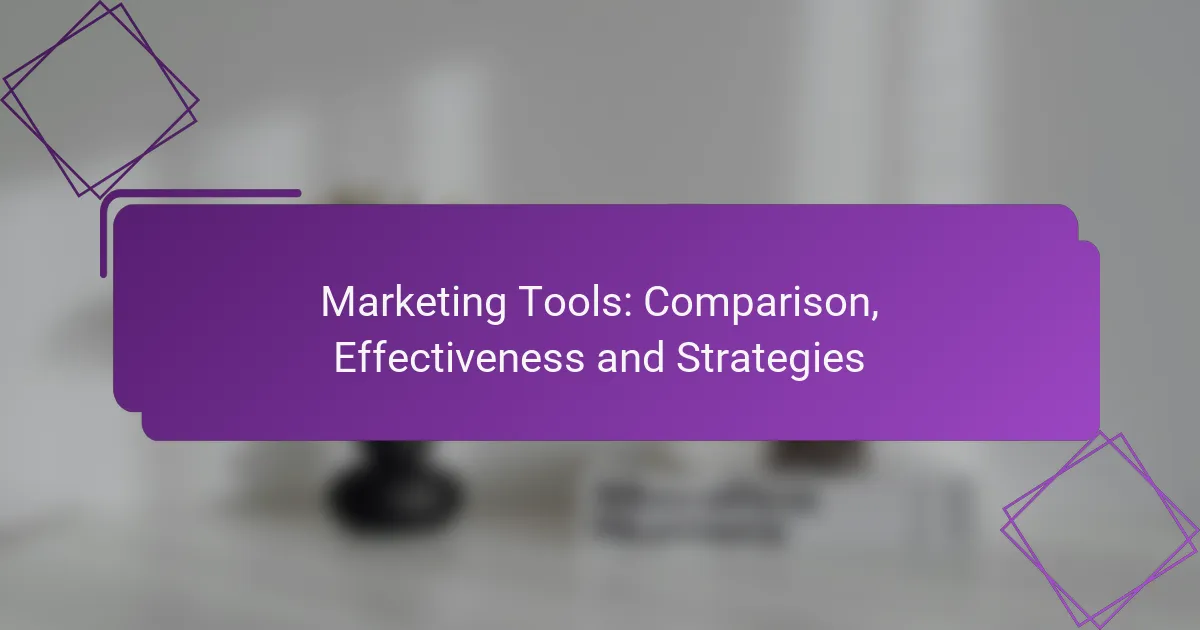In today’s competitive landscape, selecting the right marketing tools is crucial for e-commerce success, as they can streamline operations and enhance customer engagement. With a variety of options available, businesses must consider factors such as cost, user satisfaction, and integration capabilities to ensure they maximize their marketing efforts. By employing data-driven strategies and personalization techniques, companies can significantly boost their engagement and conversion rates.

What are the best marketing tools for e-commerce?
The best marketing tools for e-commerce streamline operations, enhance customer engagement, and drive sales. Key options include platforms for website management, customer relationship management, email marketing, analytics, and search engine optimization.
Shopify
Shopify is a leading e-commerce platform that allows businesses to create and manage online stores easily. It offers a range of customizable templates, payment processing options, and inventory management tools, making it suitable for both small and large retailers.
Consider Shopify’s pricing plans, which typically range from around $29 to $299 per month, depending on the features you need. Additionally, be aware of transaction fees if you’re not using Shopify Payments.
HubSpot
HubSpot is a comprehensive marketing, sales, and service software that helps e-commerce businesses manage customer relationships and automate marketing tasks. Its features include email marketing, social media management, and lead generation tools.
HubSpot offers a free tier, but advanced features can cost hundreds of dollars monthly. Evaluate your needs carefully to determine if the investment aligns with your marketing goals.
Mailchimp
Mailchimp is primarily known for its email marketing capabilities, allowing e-commerce businesses to create targeted campaigns and automate customer communications. It provides analytics to track engagement and optimize future campaigns.
Mailchimp’s pricing starts with a free plan for basic features, scaling up to around $299 per month for advanced functionalities. Ensure you segment your audience effectively to maximize engagement rates.
Google Analytics
Google Analytics is a powerful tool for tracking website traffic and user behavior, providing insights that can inform marketing strategies. It helps e-commerce businesses understand customer journeys and identify areas for improvement.
Setting up Google Analytics is free, but it requires some technical knowledge to implement correctly. Regularly review your data to make informed decisions about your marketing efforts.
SEMrush
SEMrush is an all-in-one marketing toolkit that specializes in search engine optimization (SEO) and competitive analysis. It helps e-commerce businesses improve their online visibility through keyword research, site audits, and backlink tracking.
SEMrush offers various subscription plans, starting around $119.95 per month. Use its tools to analyze competitors and refine your SEO strategies for better search rankings and increased traffic.

How do marketing tools compare in effectiveness?
Marketing tools vary significantly in effectiveness based on their cost, user satisfaction, and integration capabilities. Understanding these factors can help businesses choose the right tools to maximize their marketing efforts.
Cost-effectiveness
Cost-effectiveness is a crucial factor when evaluating marketing tools. Businesses should consider the return on investment (ROI) each tool offers relative to its cost. For instance, tools that provide analytics and automation may have higher upfront costs but can save time and resources in the long run.
When comparing costs, look for tools that offer tiered pricing models, allowing businesses to select plans that fit their budget. Free or low-cost tools can be effective for startups, while larger companies may benefit from premium features in more expensive options.
User satisfaction ratings
User satisfaction ratings provide insight into how well marketing tools meet user needs. Tools with high satisfaction ratings often indicate strong usability, effective features, and reliable customer support. Checking reviews on platforms like G2 or Capterra can help gauge user experiences.
Consider tools that consistently receive positive feedback for ease of use and customer service. A tool with a high satisfaction rating may lead to better team adoption and overall effectiveness in marketing campaigns.
Integration capabilities
Integration capabilities determine how well marketing tools work with existing systems and processes. Tools that easily integrate with Customer Relationship Management (CRM) systems, email platforms, and analytics software can streamline workflows and enhance data sharing.
When selecting a marketing tool, assess its compatibility with other tools your business uses. Look for options that offer APIs or built-in integrations to ensure seamless operation and avoid data silos. This can significantly improve the overall effectiveness of your marketing strategy.

What strategies enhance marketing tool effectiveness?
To enhance the effectiveness of marketing tools, strategies should focus on data-driven decision making, personalization techniques, and multi-channel marketing. Implementing these approaches can significantly improve engagement and conversion rates.
Data-driven decision making
Data-driven decision making involves using analytics and metrics to guide marketing strategies. By analyzing customer behavior, market trends, and campaign performance, marketers can identify what works and what doesn’t.
Key steps include setting clear objectives, collecting relevant data, and regularly reviewing performance metrics. Tools like Google Analytics or CRM software can provide insights that inform adjustments to marketing tactics.
Personalization techniques
Personalization techniques tailor marketing messages to individual customer preferences and behaviors. This approach can increase engagement by making customers feel valued and understood.
Effective personalization can include targeted email campaigns, product recommendations based on past purchases, and customized landing pages. Marketers should segment their audience to deliver relevant content, which can lead to higher conversion rates.
Multi-channel marketing
Multi-channel marketing involves engaging customers across various platforms, such as social media, email, websites, and offline channels. This strategy ensures that messages reach customers where they are most active.
To implement multi-channel marketing effectively, businesses should maintain a consistent brand message while adapting content to fit each platform’s unique characteristics. Tracking customer interactions across channels can help refine strategies and improve overall effectiveness.

What criteria should you consider when selecting marketing tools?
When selecting marketing tools, consider factors like business size, budget, and specific marketing goals. These criteria help ensure that the tools you choose align with your operational needs and strategic objectives.
Business size and scale
Your business size significantly influences the type of marketing tools you should consider. Small businesses may benefit from user-friendly, cost-effective solutions, while larger enterprises might require more robust, scalable platforms that can handle complex campaigns and large data sets.
For example, a small startup might opt for simple social media management tools, while a multinational corporation may need comprehensive customer relationship management (CRM) systems. Assess your current scale and future growth to choose tools that can adapt accordingly.
Budget constraints
Budget constraints are crucial when selecting marketing tools, as costs can vary widely. Determine how much you can allocate for marketing software, including subscription fees, training, and potential add-ons.
Many tools offer tiered pricing models, allowing you to choose a plan that fits your budget. For instance, a basic plan may start at around $10 to $50 per month, while advanced features could cost several hundred dollars. Always weigh the potential return on investment against the costs involved.
Specific marketing goals
Your specific marketing goals should guide your selection of tools. Whether you’re aiming to increase brand awareness, generate leads, or improve customer engagement, different tools serve different purposes.
For example, if your goal is to enhance email marketing, look for platforms with strong automation features and analytics. Conversely, if social media engagement is your focus, consider tools that offer robust scheduling and analytics capabilities. Clearly define your objectives to ensure the tools you choose will help you achieve them effectively.

How do marketing tools impact customer engagement?
Marketing tools significantly enhance customer engagement by streamlining communication and personalizing interactions. They enable businesses to analyze customer behavior, tailor content, and foster meaningful connections, ultimately driving loyalty and sales.
Types of marketing tools
Marketing tools can be categorized into several types, including email marketing platforms, social media management tools, customer relationship management (CRM) systems, and analytics software. Each type serves a unique purpose, from automating outreach to tracking customer interactions and measuring campaign effectiveness.
For example, email marketing tools like Mailchimp or Constant Contact allow businesses to create targeted campaigns based on customer preferences, while CRM systems like Salesforce help manage customer data and interactions. Choosing the right mix of tools is crucial for maximizing engagement.
Effectiveness of marketing tools
The effectiveness of marketing tools is often measured by their ability to improve customer engagement metrics such as open rates, click-through rates, and conversion rates. Tools that provide analytics and reporting features enable businesses to assess performance and make data-driven decisions.
For instance, a well-executed social media campaign using tools like Hootsuite can lead to increased brand visibility and engagement, while email marketing campaigns can achieve open rates in the range of 15-25%. Regularly reviewing these metrics helps refine strategies for better results.
Strategies for using marketing tools
To effectively use marketing tools, businesses should develop a clear strategy that aligns with their goals. This includes defining target audiences, setting measurable objectives, and selecting the right tools for the job. A cohesive strategy ensures that all marketing efforts are coordinated and impactful.
Additionally, integrating tools can enhance their effectiveness. For example, linking a CRM with email marketing software allows for personalized outreach based on customer data. Regular training and updates on tool capabilities can also help teams leverage their full potential.


